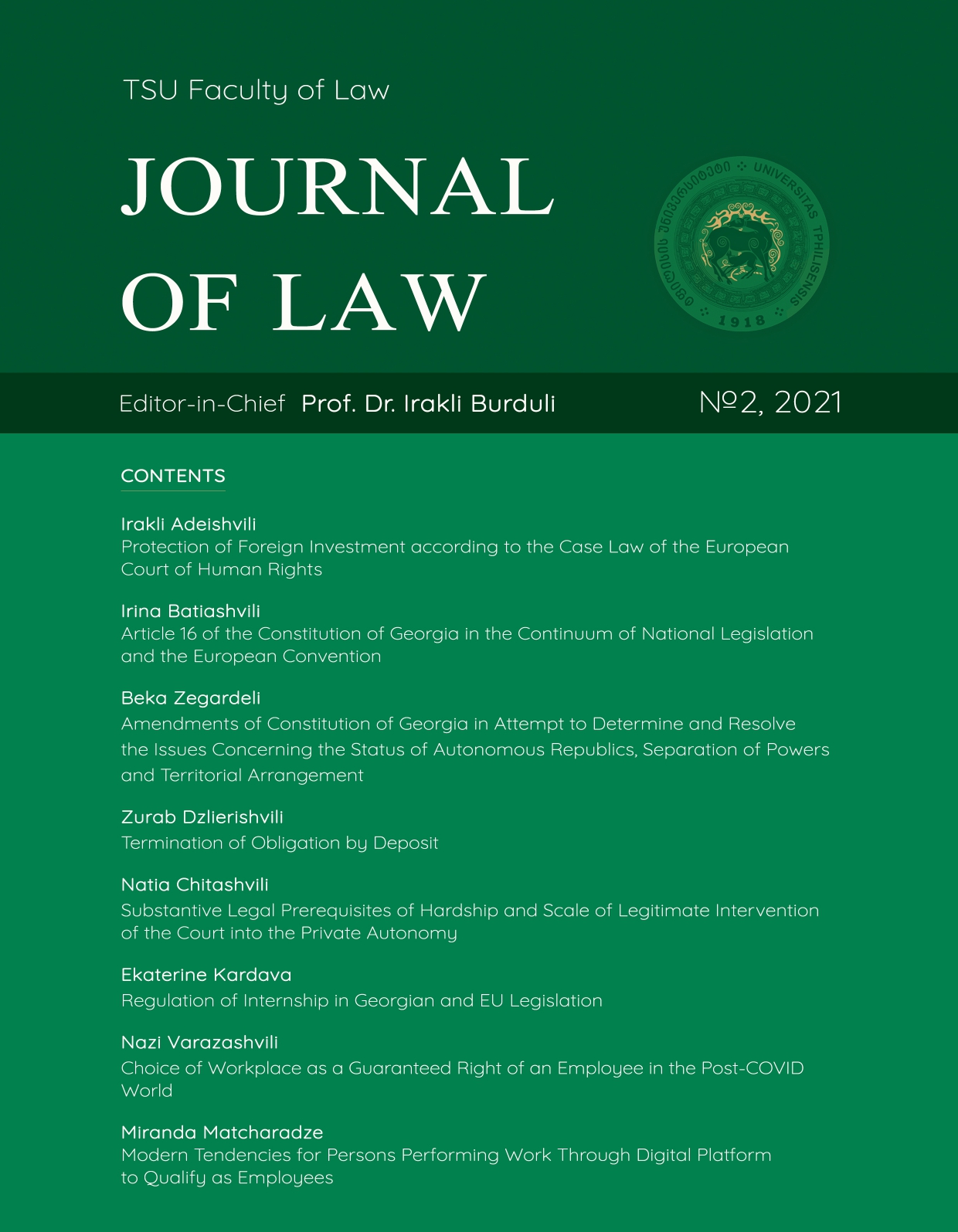Changing the Classification of a Business Transaction based on its Form and Substance in Tax Law Relations
DOI:
https://doi.org/10.60131/jlaw.2.2021.3629Keywords:
Tax, Tax System, Directive, Tax Code, CJEU, Substance and form, Georgian Court SystemAbstract
Tax law relations are known by their complexity. Generally, tax law-related relations always derive from civil relations, where people participate. Income tax is due when a person is employed, or is self-employed and conducts economic activities. Value Added Tax is due when a taxpayer conducts economic activities and such economic activities are based on different types of contracts. The taxpayer supplies goods or services to the end-users and therefore, is obliged to pay Value Added Tax.
There are many cases when parties conduct a contractual agreement, which does not reflect economic reality. Article 73 (9) of the Georgian Tax Code gives Georgian Tax Authorities the possibility to change the form when the substance does not collide with the form. But the legislation is very general and does not include any indication or legal prerequisites on how this should be done.
This article will serve a purpose to define in which cases tax authorities are allowed to change the form of the business operation, especially when the parties conducted completely different contracts and will evaluate the risks, which might be in presence if the tax authorities will use the norm in a wrong way.
This article will review tax authority’s practices and the Georgian Court approach towards the issue.
References
Tax Code of Georgia, LHG, 54, 17/09/2010.
Civil Code of Georgia, Parliamentary Gazette, 31, 24/07/1997.
General Administrative Code of Georgia, LHG, 32(39), 25/06/1999.
Administrative Procedural Law of Georgia, LHG, 39(46), 23/07/1999.
De Broe L., International Tax Planning and Prevention of Abuse: a Study under Domestic Tax Law, Tax Treaties and EC Law in Relation to Conduit and Base Companies, IBFD Publications, Amsterdam, 2008, 168, 170.
Doesum A. V., Kesteren H. V., Norden G.-J. V., Fundamentals of EU VAT Law, Netherlands, 2016, 123.
Gordon R. K., Thuronyi V., Tax Legislative Process in Tax Law Design and Drafting, Thuronyi V. (ed.), Washington D.C., 1996, 2.
Henkow O., Financial Activities in European VAT, A Theoretical and Legal Research of the European VAT System and the Actual and Preferred Treatment of Financial Activities, Netherlands, 2007, 60, 75.
Jespersen C. B., Intermediation of Insurance and financial Services in European VAT, Netherlands, 2011, 32.
Kesteren H. V., Taxable and Non-Taxable Transactions, in: Lang M., Pistone P., Rust A., Schuch J., Staringer C., Raponi D. (Eds.), Recent Developments in Value Added Tax,Vienna, 2016, 221, 225, 226, 228, 231.
Li J., Economic Substance: Drawing the Line between Legitimate Tax Minimization and Abusive Tax Avoidance, Canadian Tax Journal, Vol. 54, Issue № 1, 2006, 43-44, 53.
Papis-Almansa M., Insurance in European VAT on the Current and Preferred Treatment in the Light of the New Zealand and Australian GTS System, Netherlands, 2016, 133.
Radeva Y., VAT Implications of Cancellation Charges: New Substance-over-Form Rule?, International VAT Monitor, Vol. 30, № 1, 2019, 14.
Rogava Z., Tax Code Commentaries, Tbilisi, 2012, 479 (in Georgian).
Rosenblatt P., General Anti-Avoidance Rules for Major Developing Countries, Series on International Taxation, Vol. 49, Kluwer Law International, 2015, 134, 138.
Rosenblatt P., Tron Manuel E., Anti-Avoidance Measures of General Nature and Scope - GAAR and Other Rules, IFA Cahiers, Vol. 103A, International Fiscal Association, Rotterdam, 2018, 14.
Sijbren C., A VAT Primer for Lawyers, Economists, and Accountants, The Vat Reader, Tax Analysts, 2011, 2, www.taxhistory.org/www/freefiles.nsf/Files/VATReader.pdf/$file/VATReader.pdf [06.09.2022].
Terra B. J. M., Kajus J., Introduction to European VAT (Recast), Amsterdam, 2020, 128.
Uridia G., Tax Code Commentaries, Tbilisi, 2011, § 73.9, 486-491 (in Georgian).
Zimmer F., Form and Substance in Tax Law – General Report, The Hague, 2002, 16-97.
Case C-653/11, Her Majesty’s Commissioners of Revenue and Customs v Paul Newey, ECR [2013].
Case C-212/97, Centros Ltd v Erhvervs- og Selskabsstyrelsen, ECR [1999].
Decision of July 18, 2018 case № BS-854-846(K-16) of Supreme Court of Georgia.
Decision of March 14, 2017 case № BS-702-595(2K-16) of Supreme Court of Georgia.
Decision of March 16, 2016 case № 3B/2026-15 of Tbilisi Appeal Court.
Decision of April 27, 2016 case № 3B/634-15 of Tbilisi Appeal Court.
Decision of May 13, 2015 case № 3/7152-15 of Tbilisi City Court.
Decision of March 13, 2015 case № 3/2173-14 of Tbilisi City Court.
Decision of September 23, 2014 case № BS-246-243(K-13) of Supreme Court of Georgia.
Decision of February 18, 2014 case № BS-463-451(K-13) of Supreme Court of Georgia.
Downloads
Published
How to Cite
Issue
Section
License
Copyright (c) 2021 Grigol Chkhaidze

This work is licensed under a Creative Commons Attribution-ShareAlike 4.0 International License.









